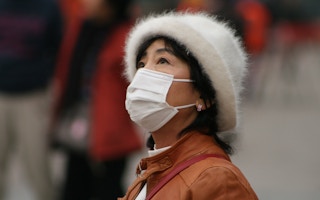A global deal to protect nature could be jeopardised by China’s decision this week to seek a further postponement of UN talks due to a Covid-19 outbreak, environmentalists said, with many calling for the summit to be switched to another country.
About 195 nations were set to finalise an accord to safeguard plants, animals and ecosystems at the UN summit, known as COP15, which had been due to start late last month in the Chinese city of Kunming.
But with many cities in lockdown under China’s “zero-Covid” strategy, the country proposed that the talks - already delayed four times - be postponed until 2023, scuppering UN hopes for the meeting to be held in the third quarter, green groups said.
“The global biodiversity crisis is an existential threat to our planet (and) the loss of habitats and species do not wait,” Li Shuo, a policy advisor at Greenpeace China, told the Thomson Reuters Foundation by email.
“
We cannot galvanise public or political support for an ambitious outcome if we don’t know when the COP will happen. It is hindering our ability as a community to work together towards this critical global moment.
Georgina Chandler, policy expert, Royal Society for the Protection of Birds
“COP15 has to happen in 2022,” said Li, an observer of the talks, urging all countries involved to find a solution.
Chinese officials working on COP15 and a spokesperson for the UN Convention on Biological Diversity, which is supporting the negotiations, did not immediately respond to requests for comment.
Improving conservation and management of natural areas, such as parks, oceans, forests and wildernesses, is seen as crucial to safeguarding the ecosystems on which humans depend and limiting global warming to internationally agreed targets.
But forests are still being cut down - often to produce commodities such as palm oil and beef - destroying biodiversity and threatening climate goals, as trees absorb about a third of planet-warming emissions produced worldwide.
The COP15 talks have been bogged down by difficulties of meeting face to face during the coronavirus pandemic, with the first in-person talks in two years on the agreement and ways to put it into practice taking place in Geneva in March.
A central pillar of the planned nature pact is to conserve at least 30% of the planet’s land and oceans by 2030.
Agree to switch
Georgina Chandler, an international policy expert at the Britain-based Royal Society for the Protection of Birds, said further COP15 delays would risk momentum being lost, calling for a date to be set in the third quarter of this year.
“We cannot galvanise public or political support for an ambitious outcome if we don’t know when the COP will happen,” Chandler said.
“It is hindering our ability as a community to work together towards this critical global moment,” she added.
Hosting a major UN environment conference for the first time in China was seen by green groups as an important step for the country towards playing a more prominent role both domestically and internationally on biodiversity.
In an effort to give the talks a boost, China launched a multimillion-dollar biodiversity fund late last year to support nature protection in developing countries.
Financing for poorer nations to help them meet the goals of a nature deal has long been a sticking point for the talks.
But geopolitical tensions and diplomatic pride may now be hindering attempts to persuade China to agree to switch the talks to somewhere less-impacted by Covid-19, analysts said.
COP15 could still take place in 2022, but not until the fourth quarter, said Susan Lieberman, vice president of international policy at the New York-based Wildlife Conservation Society.
“The best outcome would be to have COP15 in 2022, and for China to recognise it can’t be in China due to Covid,” Lieberman said.
China critical
The latest delay means countries will have less time to meet 2030 targets and could ultimately lead them to curtail their ambitions, said Linda Krueger, director of biodiversity at The Nature Conservancy, a US-based green group.
There are now less than eight years left to make good on promises set out in the planned 10-year deal, said Fred Kumah, a vice president at the African Wildlife Foundation, but he said it was important for China to go ahead with hosting the talks.
“China’s role in addressing global biodiversity loss is critical to say the least,” he said, urging Beijing to set a new date for the meeting.
“Most of the world is now living with Covid-19, so China needs to go forward with the meeting in a manner that assures participants of their security by way of health,” he added.
“The world needs to encourage China to take up their global role and responsibility in this respect.”
This story was published with permission from Thomson Reuters Foundation, the charitable arm of Thomson Reuters, that covers humanitarian news, climate change, resilience, women’s rights, trafficking and property rights. Visit http://news.trust.org/climate.










